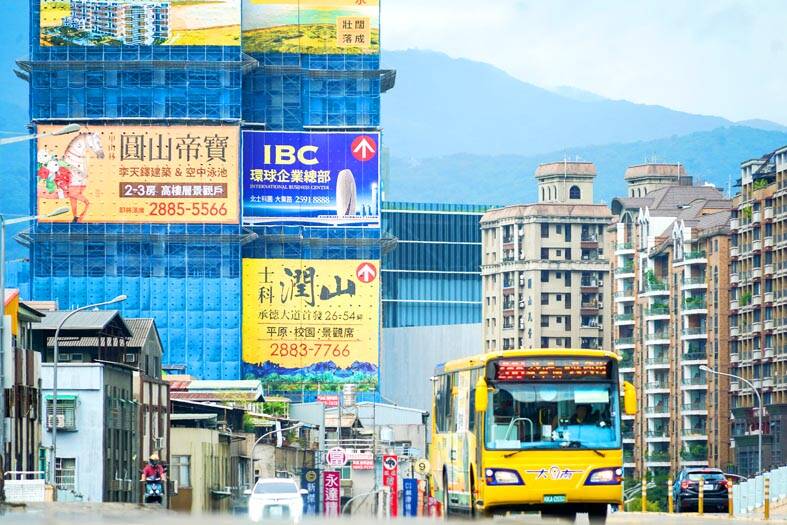Mortgage interest rates last quarter spiked to a 15-year high of 2.23 percent despite a decline in loan applications, as local lenders slowed real-estate lending to support the central bank’s credit controls, Taiwan Realty Co (台灣房屋) said yesterday.
“The data suggests that buying a home is growing increasingly difficult,” the brokers said, citing data from the Joint Credit Information Center (聯徵中心).
The uptick in mortgage burdens came even though the central bank left its policy rates unchanged in the past two quarters and hiked the lenders’ required reserve ratios to drain money from the market, head researcher Charlene Chang (張旭嵐) said.

Photo: CNA
Further, the monetary policymaker tightened lending terms for non-first houses nationwide to pre-empt a housing bubble, as house loans neared the record high of the financial crisis in 2009.
The average mortgage burden stood at NT$10.43 million (US$320,844) across Taiwan, while the number of mortgages shrank by 6.5 percent, or 4,235, to 60,908 during the July-to-September period, Chang said, adding that mortgage burdens in Taipei are higher at NT$18.32 million, consistent with the capital city’s unaffordable house prices.
The decrease in loan applications showed the selective credit controls succeeded in cooling real-estate lending and the impact would grow more evident this quarter and beyond, Chang said.
It would now take three to four months for lenders to review mortgage applications, from one to one-and-a-half months before the tightening, Sinyi Realty Inc (信義房屋) said, adding that lenders raised borrowing costs to discourage prospective buyers and moderate mortgage operation.
Consequently, the central bank might choose to stay put in its board meeting next week and give the market more time to assimilate to its credit controls, Sinyi said.
The current quarter is traditionally the high season for the housing market, but a slowdown appears inevitable, Taiwan Realty said.
Developers have generally turned conservative about launching presale projects next year and indicated plans to trim price tags in areas with heavy supply, Chang said.
Huaku Development Co (華固建設) said on Wednesday that it and peers would adopt a low-key business approach, a departure from the bull market in the first half of this year.
The strategy suggests a decline in the volume of presale projects and new houses next year, Huaku chairman Chung Jung-chang (鍾榮昌) said, predicting that house prices would hold steady in Taipei and New Taipei City, but would drop 5 percent to 10 percent elsewhere.
Property researcher My Housing Monthly (住展雜誌) said the conservative practices stem from soft demand rather than an attempt to appease the central bank.
Unsold house projects last month soared to 1,017 in northern Taiwan alone, with the most difficulty in Yilan and Taoyuan, the publication said.

Vincent Wei led fellow Singaporean farmers around an empty Malaysian plot, laying out plans for a greenhouse and rows of leafy vegetables. What he pitched was not just space for crops, but a lifeline for growers struggling to make ends meet in a city-state with high prices and little vacant land. The future agriculture hub is part of a joint special economic zone launched last year by the two neighbors, expected to cost US$123 million and produce 10,000 tonnes of fresh produce annually. It is attracting Singaporean farmers with promises of cheaper land, labor and energy just over the border.

US actor Matthew McConaughey has filed recordings of his image and voice with US patent authorities to protect them from unauthorized usage by artificial intelligence (AI) platforms, a representative said earlier this week. Several video clips and audio recordings were registered by the commercial arm of the Just Keep Livin’ Foundation, a non-profit created by the Oscar-winning actor and his wife, Camila, according to the US Patent and Trademark Office database. Many artists are increasingly concerned about the uncontrolled use of their image via generative AI since the rollout of ChatGPT and other AI-powered tools. Several US states have adopted

A proposed billionaires’ tax in California has ignited a political uproar in Silicon Valley, with tech titans threatening to leave the state while California Governor Gavin Newsom of the Democratic Party maneuvers to defeat a levy that he fears would lead to an exodus of wealth. A technology mecca, California has more billionaires than any other US state — a few hundred, by some estimates. About half its personal income tax revenue, a financial backbone in the nearly US$350 billion budget, comes from the top 1 percent of earners. A large healthcare union is attempting to place a proposal before

KEEPING UP: The acquisition of a cleanroom in Taiwan would enable Micron to increase production in a market where demand continues to outpace supply, a Micron official said Micron Technology Inc has signed a letter of intent to buy a fabrication site in Taiwan from Powerchip Semiconductor Manufacturing Corp (力積電) for US$1.8 billion to expand its production of memory chips. Micron would take control of the P5 site in Miaoli County’s Tongluo Township (銅鑼) and plans to ramp up DRAM production in phases after the transaction closes in the second quarter, the company said in a statement on Saturday. The acquisition includes an existing 12 inch fab cleanroom of 27,871m2 and would further position Micron to address growing global demand for memory solutions, the company said. Micron expects the transaction to